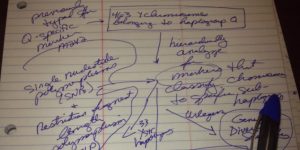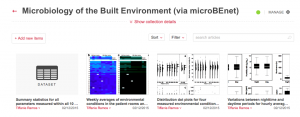This is a story of my first involvement pushing a publication that wanted to be University owned “all rights reserved” to becoming one released under a Creative Commons license. I’m not sure that the arcane details will be of interest to many people, but I think there’s an important lesson here about sticking to your …
The six finalists for the Open Science Prize were announced today. The Open Science Prize is “The Open Science Prize is a collaboration between the Wellcome Trust, the US National Institutes of Health (NIH) and the Howard Hughes Medical Institute to unleash the power of open content and data to advance biomedical research and its …
From vaccinations to climate change, getting science wrong has very real consequences. But journal articles, a primary way science is communicated in academia, are a different format to newspaper a… Source: How to read and understand a scientific paper: a guide for non-scientists This article, by Jennifer Raff, is definitely worth a read and I …
I just got pointed to this letter written by the President of the Alfred P. Sloan Foundation Paul Joskow on “Research Integrity and Reproducibility” and it is definitely worth a read. It is available as part of the Sloan Foundation 2014 Annual report. It starts on pXiii. It is also available via Research Gate. And …
What is better than Open Access?! Citizen Science AND Open Access! The March issue of JMBE was all that. You have probably already heard of Kittybiome and/or The Koala Project, 2 ongoing projects in the Eisen Lab. Both projects were featured in the paper, “Crowdfunding Campaigns Help Researchers Launch Projects and Generate Outreach”, published in …
I got an email the other day about a new feature at Figshare. It was about a new feature they have called “Collections“. But before I describe that I should probably describe Figshare. Figshare is a repository for depositing and sharing various digital objects including not just Figures (which they name kind of implies … …
Posting this which I received by email: Colleagues, We are thrilled to announce the launch of VERVE Net (https://www.protocols.io/g/verve-net), an on-line platform that equips the virus ecology community with a means to easily run, modify, publish and discuss laboratory, field and bioinformatic protocols. The forum also provides new ways to navigate the literature (a publication …
Gearing up the UNITE database for the built mycobiome The team behind the UNITE database for molecular identification of fungi has been granted support from the Sloan Foundation to strengthen the support for fungi from the built environment. Launched in 2001 as an ITS database for identification of ectomycorrhizal fungi in the Nordic countries, UNITE …
Regular visitors to the microBEnet website maybe have noticed some big changes in the last few months to the site layout. More interesting than the visual changes, are the things going on behind the scenes. microBEnet has partnered with Press Forward which is a free and open-source project that aims to “enable teams of researchers …
scikit-bio is a library implementing core bioinformatics algorithms and data structures, and providing support for bioinformatics data munging. You can learn more about the project by watching Jai Rideout and Evan Bolyen’s 20 minute SciPy 2015 talk. scikit-bio currently supports Python 2 (i.e., Legacy Python) and Python 3. We’re considering dropping support for Python 2, …




